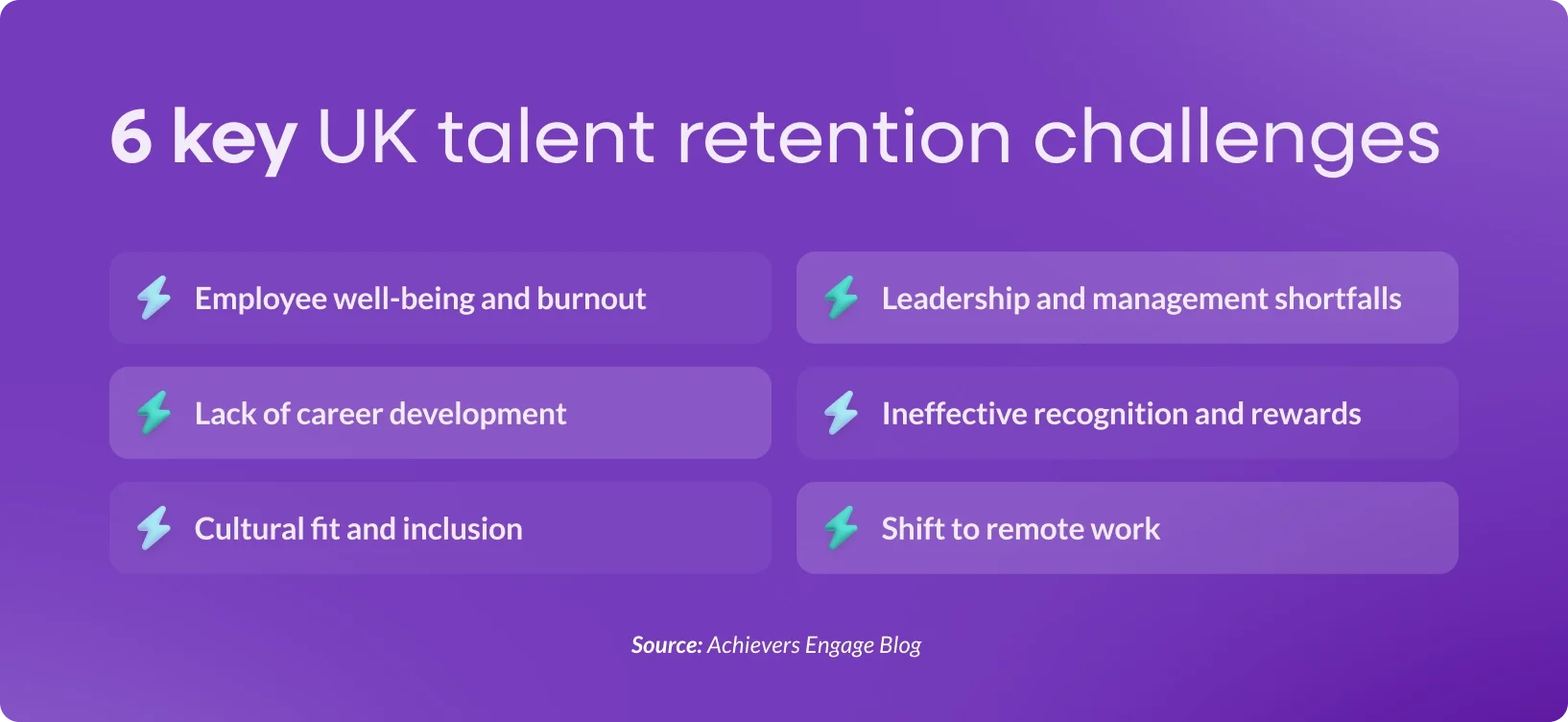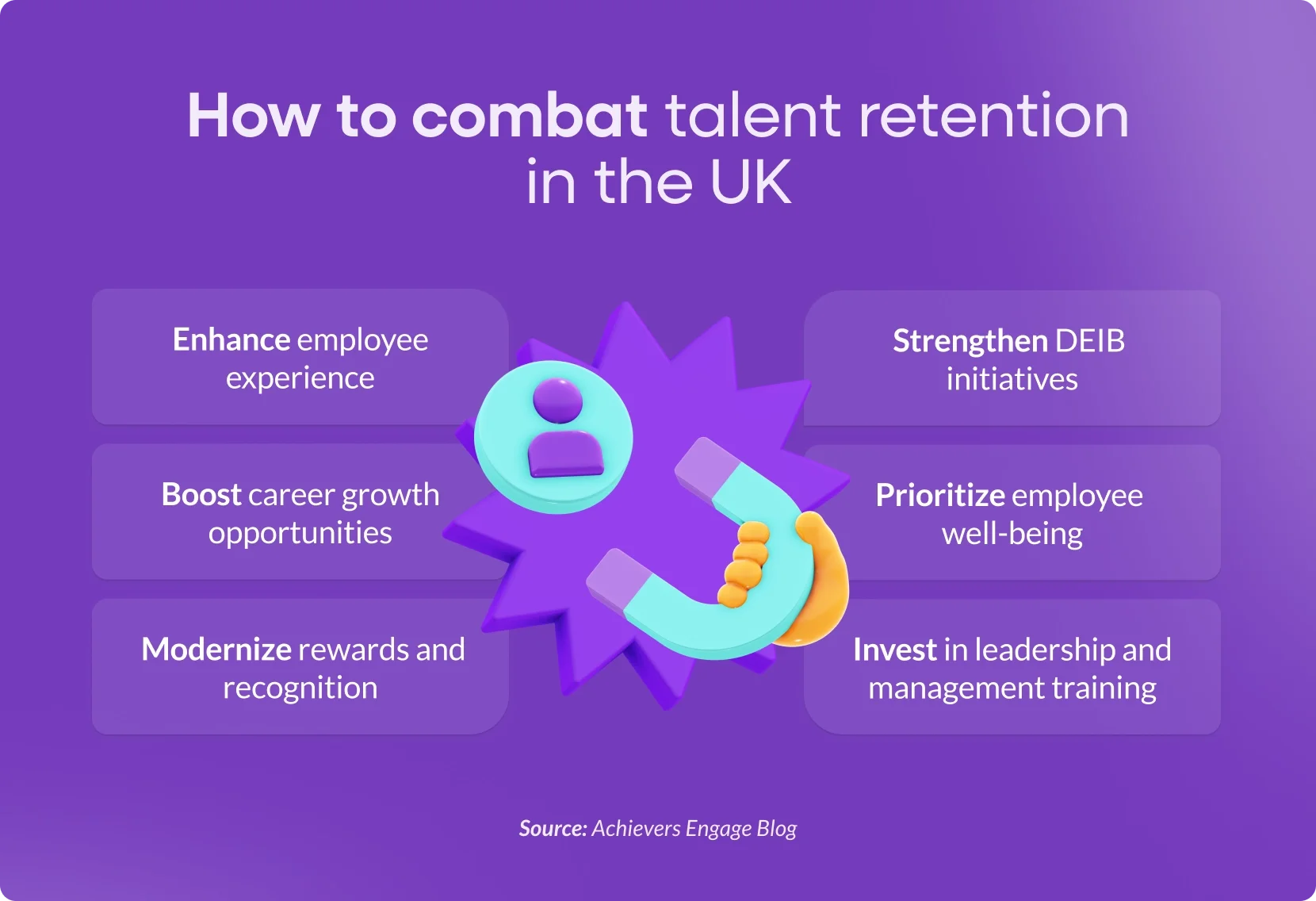Table of contents
UK talent retention challenges have never been more apparent — or more nuanced — for employers. With 51% of HR professionals naming retention as their biggest concern, it’s clear that organisations are feeling the pressure. And it’s not just about avoiding high turnover costs; losing key employees can disrupt productivity, weaken team morale, and affect long-term success.
So how can companies face these challenges head on? The first step is to look at why retention is such a challenge right now and explore some of the key factors driving it. Next, we’ll share practical strategies to help you keep your best people engaged and committed. Addressing these obstacles can help your organisation build a stronger, more loyal workforce — one that’s ready to excel now and into the future.
The current state of talent retention in the UK
HR leaders in the UK know that the workplace landscape is changing, and employees are holding their employers to higher standards than ever before. With more opportunities available to skilled workers and a focus on mental health, career development, and company values, organisations are being asked to meet the moment. However, a Ciphr study found that nearly 46% of employees surveyed aren’t confident their employers will meet their work-life balance, wages, and wellness support needs.
These UK talent retention challenges aren’t temporary. They represent a significant shift in the current landscape that must be addressed.
Market trends
Staff retention is one of the biggest UK talent retention challenges right now. In 2024, Achievers Workforce Institute (AWI) surveyed employees across the UK and found 43% were unsure if they would job hunt in 2024. In 2025, those numbers are unlikely to shift significantly.
Industries like tech, healthcare, and retail are feeling this pressure the most, with high turnover rates making it harder to keep up with demand for skilled workers. When added to the rising expectations around flexibility and meaningful work, it’s clear why retention has become such a hot topic. Tackling this issue means focusing on engagement, recognition, and strategies that meet employees where they are.
Economic and social factors
The rising cost of living and inflation are putting extra pressure on employers, as employees now expect higher wages to meet their needs. On top of that, hybrid and remote work environments have changed the game, and what used to be perks are now seen as standard.
Generational differences add another piece to the puzzle, with younger generations prioritising purpose and work-life balance in ways previous generations didn’t. These shifts mean traditional approaches to retention might not cut it anymore, and organisations need to stay flexible and creative to keep their people engaged.
Emerging skills gaps
The fight for top talent is tougher than ever, especially in specialised fields like IT, healthcare, and engineering. Many employers are still feeling the effects of Brexit, with an estimated shortfall of nearly 330,000 workers.
To keep up, employers are improving their efforts to reskill and upskill their teams, but holding onto those star performers is still a challenge. Offering what truly matters most to employees and creating an employee experience that keeps people engaged is key to staying ahead in an increasingly competitive landscape.

6 UK talent retention challenges
With shifting employee expectations, economic pressures, and a rapidly changing professional landscape, understanding why employees leave has never been more important. Here are six major UK talent retention challenges and what employers can do to address them.
1. Employee well-being and burnout
Stress and mental health issues are some of the top reasons employees leave their jobs. According to Ciphr, 70% of employees surveyed were able to identify at least one aspect of their workplace that contributes to their stress levels. While some organisations offer well-being programmes and initiatives, access is inconsistent across industries, with areas like retail and hospitality falling behind.
UK talent retention challenges are often created from the lack of mental health resources, so employers need to prioritise well-being initiatives like counselling services and flexible working policies to reduce burnout and create a more positive workplace culture.
2. Lack of career development opportunities
Stagnant career paths are driving employees to seek growth opportunities elsewhere. An Achievers AWI report found that career progression is the leading reason employees job hunt. Upskilling and reskilling programmes are essential in addressing this challenge, allowing employees to advance their careers while meeting organisational needs.
Employers who invest in structured career progression plans and professional development initiatives are better positioned to tackle UK talent retention challenges and keep their workforce motivated.
3. Cultural fit and inclusion
Employees who feel disconnected from organisational values or excluded from workplace culture are more likely to leave. Research shows that companies with strong diversity, equity, and inclusion (DEI) initiatives see 50% reduction in turnover risk, 75% decrease in sick days and 167% in employer net promoter score (NPS). When employees feel a genuine sense of belonging, their engagement and loyalty increase.
Addressing UK talent retention challenges means organisations must actively cultivate those inclusive cultures, with clear DEI goals and initiatives that align with employee values, to improve both morale and retention.
4. Leadership and management
Leadership plays a key role in employee retention, but poor management practices are still one of the primary reasons employees leave. Employees want leaders who communicate transparently, lead with empathy, and provide clear guidance. Those manager qualities are part of the foundation of building a healthy company culture and retaining top talent.
To achieve these goals, organisations must prioritise leadership training that focuses on emotional intelligence, active listening, and effective communication. Investing in leadership training is the one of the best ways to overcome UK talent retention challenges and create a supportive environment where employees can do their best work.
5. Ineffective recognition and rewards
Recognition gaps can leave employees feeling undervalued and disengaged. Achievers’ 2024 State of Recognition Report shows that 30% of employees recognised at least monthly rarely think about looking for work elsewhere, compared to 13% recognised annually or less. Today’s workforce expects more personalised and meaningful appreciation, whether that’s through flexible benefits, peer recognition platforms, or personalised rewards.
Employers need to move beyond one-size-fits-all approaches and embrace recognition strategies that make employees feel truly seen and valued for their contributions.
6. Shift to remote work
The rise of remote work has brought new UK talent retention challenges, especially around maintaining engagement and connection. Remote employees often feel isolated from their colleagues and leaders, and with more global employers offering remote-friendly roles, competition for talent has increased.
To adapt to these changes, it’s important for companies to adjust their communication and collaboration strategies, invest in technology that supports remote teams, and offer resources to help employees stay connected and productive.
Root causes behind retention challenges
UK organisations are facing a number of challenges when it comes to retaining employees. Understanding the root causes behind these challenges can help businesses make smarter, more strategic decisions that improve retention in the long run.
Disconnect between employer and employee expectations
One major reason employees leave is the disconnect between what they expect from their job and what their employer offers. Many workers want a better work-life balance, fair pay, and opportunities to grow, but not all companies are meeting these needs.
In fact, 44% of UK tech workers surveyed are leaving roles that offer little opportunity for advancement, and 55% are looking for better pay. Employers who don’t keep up with these expectations risk losing their best people to businesses that offer more of what employees are looking for.
Underinvestment in employee experience
When companies don’t focus enough on keeping employees engaged or providing the right support, workers can quickly feel undervalued. Recognition and appreciation are key drivers of employee productivity, engagement, and help promote positive behaviours.
By putting more emphasis on things like employee development, benefits, and creating a positive workplace culture, organisations can make their staff feel more valued and improve retention.
Reactive versus proactive approaches
Many companies wait until turnover is already high before they address retention issues, which is a reactive way of dealing with the problem. By the time they act, it might be too late to keep the people who are already thinking of leaving.
A proactive approach — like regularly checking in with employees, gathering feedback, and offering consistent recognition — helps businesses find potential problems before they escalate. Being proactive means you can take action early and keep employees happier and more committed.

How to solve UK talent retention challenges
Solving UK talent retention challenges requires a multi-layered approach. With employee expectations changing and competition for top talent growing, organisations need to be proactive in addressing the factors that influence employees’ decisions to leave.
Here are five strategies that can help businesses keep their best people and build long-term loyalty:
1. Enhance employee experience
The employee experience includes all of the interactions an employee has within the workplace, from the interview to the onboarding process and beyond. Here’s how you can build a better employee experience:
- Implement feedback tools into your organisation so employees can express their thoughts and feelings and offer suggestions, then act on that feedback.
- Recognise your employees for the work they contribute, both the big accomplishments and the small wins. Tailor recognitions to the individual and ensure you’re showing appreciation on a regular basis.
- Offer flexible work arrangements and added resources to support employee well-being, whether that’s creating employee resource groups (ERGs), offering childcare assistance, or wellness programmes.
- Invest in your employees’ development. Offer access to online learning tools, have one-on-one career discussions, or offer in-house training programmes.
2. Boost career growth opportunities
A lack of career progression is a major factor driving UK talent retention challenges, with 42% of HR pain points revolving around closing skills gaps. Offering clear roads for advancement and investing in leadership development can help employees see a future within the company.
Employees who understand how they can grow and develop within their roles are more likely to stay engaged and loyal. Providing opportunities for upskilling and mentoring can also increase retention by empowering employees to take ownership of their career growth.
3. Modernise rewards and recognition programmes
To modernise rewards and recognition, it’s important to focus on real-time, personalised appreciation that resonates with employees. Gone are the days of generic gifts or seasonal perks. With AI-driven platforms, recognition can be tailored to an employee’s individual contributions and delivered right away, whether employees are in the office, working remotely, or spread worldwide. This creates a culture where employees feel truly valued, which helps boost engagement and loyalty.
4. Strengthen DEIB and culture initiatives
Diversity, equity, inclusion, and belonging (DEIB) are essential drivers of engagement and retention. UK talent retention challenges often arise when employees don’t feel a sense of belonging at work. Practical ways to build an inclusive culture include offering DEIB training, promoting diverse hiring practices, and ensuring policies are in place to support all employees equally. When employees feel that their values align with their company, they’re more likely to stay committed to the organisation for the long haul.
5. Invest in leadership and management training
Investing in leadership and management training is key to improving team dynamics and retention. Upskilling managers can help them lead more effectively, build stronger relationships, and better support their teams. Authentic leadership, where managers are approachable, transparent, and emotionally intelligent, plays a huge role in engagement. When employees feel supported and guided by skilled leaders, they’re more likely to stay and thrive in their roles.
Build a UK talent retention strategy that drives business results
There’s no doubt employers in the UK are facing talent retention challenges, with economic factors, mental health, skills gaps, and workplace culture all playing a role. While these challenges aren’t an overnight fix, there are actionable steps organisations can take to address these issues in a way that builds a foundation for future success.
Achievers helps companies across the UK change the way they think about employee retention. Through our online platform, we help employers improve morale, engagement, productivity, and encourage positive behaviours. Our customers are 2.5x more likely to see increased retention compared to other providers and 2x more likely to see a long career with their current company — proving that there is power is recognition.
We’re ready to help you create a culture that you and your employees can be proud to be a part of.



